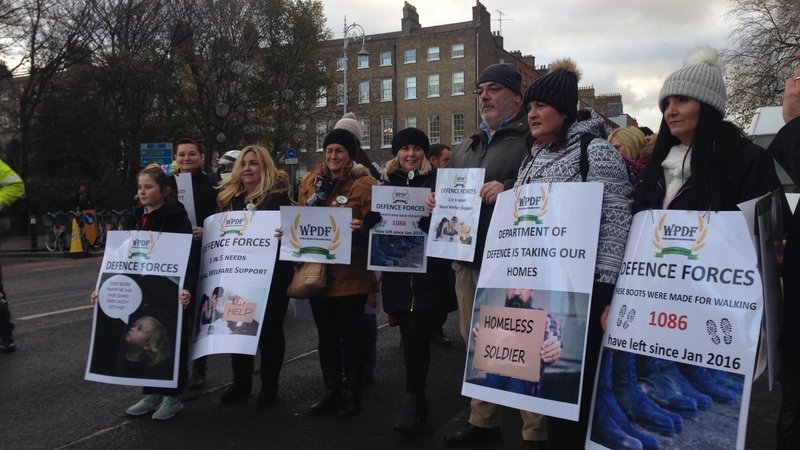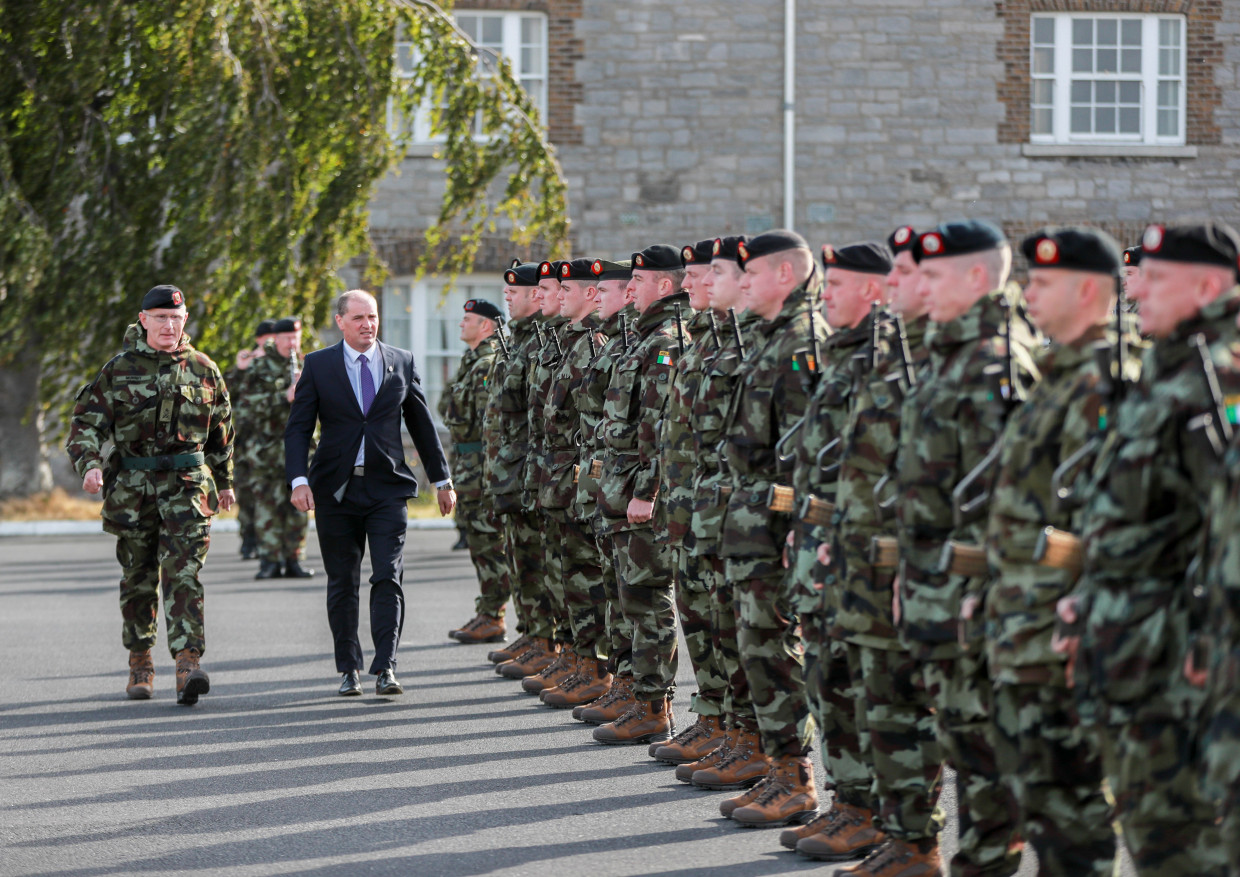In Cork Bay, two of the Irish navy’s most impressive ships – flagship LÉ Eithne and coastal patrol vessel LÉ Orla – are tied up indefinitely. There aren’t enough sailors to man them properly, so they lie there rusting.
The government denies that the ships are docked there because of a lack of manpower, or at least doesn’t say it explicitly. In June, 2019, the defence forces press office told the Irish Examiner that the ships were there “due to ongoing personnel challenges and to Óglaigh na hÉireann’s commitment to valuing its personnel, their welfare and safety”.
Cathal Berry, former officer and head of the Military Medical School and current general election candidate for Kildare South, tells me this is “doublespeak”.
Berry left the military last year so that he could throw his weight behind the defence forces’ cause from the outside. There is a culture of silence in the military – soldiers do not air their dirty laundry in public. So Berry had to leave his job to drum up political support for the military’s cause.
One of the main plights soldiers face is low pay. The defence forces are at the bottom of the public sector pay scale. Its main problem is the ban on industrial action. The army doesn’t go on strike – it’s part of their code.
Much of the blame for this is laid at the Department of Defence’s door.
“Unfortunately the civil service – they have no real life expertise in strategic management”, Berry says. “They’re just career administrators, ticking boxes, saving money to make themselves look good. That’s their priority.”
Look at me minister – I’m returning all this unspent money in the defence budget. Please promote me in the next round of interviews
Currently, the department works under budget. It does this firstly by keeping the number of soldiers in the army below designed strength, and secondly by underpaying soldiers. Berry tells me that soldiers get paid €3 an hour on the weekend, something he describes as “completely illegal”. He’s probably right.
While soldiers – because of their unique position in society – are excluded from a lot of employment legislation, they are not excluded from minimum wage legislation. The department can, however, point to lump sums that soldiers receive that add up to the equivalent of the minimum wage.
But even. if it didn’t add up, soldiers don’t have any effective mechanisms to complain, or even to question whether this really is the case.
Barry Crushell, a former army officer and a solicitor specialising in employment law, says that “if a member of the defence forces can demonstrate that they have worked in excess hours comparable to what they have been paid, and that their rate of pay goes beyond the minimum rate of pay, then they have a legitimate claim”.
“The problem”, he says, “is that the official side – the department of defence – point to a number of allowances that the DF personnel get on a lump-sum basis, and this essentially constitutes your overtime”.
Crushell says these lumps sums were negotiated at a time when the army was in a “healthier position”. But times have changed since then. The recruitment crisis means that the army currently has 8,600 enlisted soldiers – some 900 below the number that experts say the army should have in its ranks. But fewer soldiers are doing the same amount of work as before.
“What I would suggest”, Crushell says, “is that what may have been fair and reasonable in times gone by in terms of remunerating members of the defence forces for their service has not kept up to date with changes both in society and in the organisation itself”.
But reduced numbers in the army, while detrimental to soldiers’ pay and conditions, is advantageous to the Department of Defence: it can use the extra salaries left over from the budget to pay for equipment purchases and capability development.
Money is also sent back to the exchequer every year, something that massively irritates Berry: “[The money]’s being handed back to the central exchequer.” He imitates a civil servant: “‘Look at me minister – I’m returning all this unspent money in the defence budget. Please promote me in the next round of interviews because I’m saving the state a fortune.’”
The government blatantly underpaying its workers and sending back money to the central exchequer may seem bizarre, but in a perverse sense it is logical. Soldiers do not have access to the labour courts or the workplace relations commission – the places any other worker would go if they were being paid €3 an hour. Instead, discussions take place through an internal mechanism called the conciliation and arbitration scheme.
You couldn’t make this stuff up. It’s a case study in how not to run an organisation. It’s like a double whammy
Berry is sceptical of the scheme’s effectiveness: “There is an internal conciliation and arbitration scheme and the department of defence have ensured that it is completely dysfunctional. Even if there is an adjudication, even if the adjudicator makes a finding or a ruling, the department of defence simply does not implement it.”
Crushell is more measured in his assessment, but largely echoes Berry’s tone: “I would say that the conciliation and arbitration scheme has more moral force than it does have legal teeth.”
“It would be very rare for either the department of defence or the department of public expenditure to not abide by one of those decisions”, he tells me, “but the issue is that it can take a considerable amount of time to actually work a grievance through that system”.
“I would also say that because it’s a conciliation and arbitration scheme, it doesn’t necessarily have the adversarial nature that the workplace relations commission or the labour court have, and therefore the comprehensiveness of the application or the defence for any claim probably wouldn’t be as high.”
To make matters worse, the pay and conditions have led to an exodus from the army. The retention crisis is hammering the army’s middle management. Officers leave for better paying jobs, so cadets have to replace them. Except not just any cadet can replace a sergeant or an officer – cadets must be trained first. Recruiting to combat a retention crisis is akin to putting a square peg in a round hole.
On top of this, as people retire, the department has to pay out more and more in pensions, as well as paying the salaries of the new recruits. Berry, in his usual expressive phrasing, calls it an “actuarial catastrophe”: “It just makes no sense whatsoever. It’s an appalling waste of taxpayers’ money, and a lot of the additional funding that the department of defence has been given over the past few years is going into paying additional pensions now because of the amount of people who are leaving early.”
“It’s absolutely ridiculous. You couldn’t make this stuff up. It’s a case study in how not to run an organisation. It’s like a double whammy.”

The Wives and Partners of the Defence Forces campaign on behalf of soldiers, who can’t protest themselves.
The problems with pay and conditions may seem bizarre in the abstract, but in reality it is hitting soldiers and their families hard. Family is a major part of the defence forces – in fact, all of the people I talk to mention family at one point or another. And the effect pay and conditions is having on families seems to hurt soldiers the most.
“The conditions are so bad for military families that the soldiers, sailors and the air crew are having to leave, basically, out of respect for their families”, Berry tells me. “If someone asks you to choose between your job and your family, there’s only one correct answer to that question.”
His sentiments are common among the military – and you can see why. Being a soldier means working in adverse situations – patrolling the seas, in war zones, guarding maximum security prisons – and having a family to go home to is a relief. But when the job starts impinging on that source of relief, tensions grow higher.
In recent years, being a military husband or wife has become increasingly burdensome. Soldiers can’t earn enough to put food on the table, or pay bills. Some have to sleep in their cars outside the barracks because they can’t afford the petrol to drive home.
Sarah Walshe is a member of a group called the Wives and Partners of the Defence Forces. The rationale behind the group is that while soldiers themselves can’t protest, their spouses can. The organisation models itself on a similar group, Army Spouses Association, that was formed in the 1990s to fight for better representation for the defence forces.
“Basically they ran themselves as paper ballots in the general elections and helped shape who got in and who didn’t get in”, Walshe tells me.
Walshe appears most concerned about military families. A government policy paper called the White Paper on Defence was released in 2015. What was meant to be a vision for the future of the defence forces has been seen by many as an utter failure. Berry, for one, calls it the “whitewash paper”.
Over the years, the White Paper has taken housing away from families, it has taken healthcare away from families, it has taken all supports away from families
Walshe describes the more insidious aspects of the paper, and how it has crippled many families: “My husband is from the Curragh – born and rared in the Curragh. His mother is from the Curragh – born and rared in the Curragh. And that was a largely populated community in itself of all military families. Over the years, the White Paper has taken housing away from families, it has taken healthcare away from families, it has taken all supports away from families.”
“When the pay hasn’t compensated for those things”, she says, “one finds it a bit harder to function in society. We have a lot of families whose partner can’t hold down a job because they have three children and the cost of childcare is exceeding the cost of what they could bring home from a job”.
“Some people have a lot of family living around them and they’re able to give them a dig out. And if they come from military families, they can understand all that. Some families don’t have that.”
“Some families are very isolated, and when you don’t have somebody else to support you other than your partner, it’s a very lonely world when he’s away a lot of the time and he’s training and you’re at home with the kids all day.”
Marital problems are common among soldiers. Conor King is the general secretary of the Representative Association of Commissioned Officers, the closest thing soldiers have to a trade union. He says there is a “high enough incidence of marital break-up”, which he puts down to people being separated from their families. Counselling for couples navigating choppy waters is provided for by the army, but it is only available if the marriage is about to break down – prevention is not a priority.
“Our relationship has to be unstable to be able to access some of that counselling”, Walshe says. “That’s another part we’re lobbying – that we need more supports, particularly when we’re dealing with a partner that could be away for a long period of time in conflict zones.”
“They could be coming home; they might have some PTSD to deal with. We’re not equipped to support them. We don’t get any of that type of support. There is a personal support service there but it’s very difficult to ring your husband’s job and ask for help.”

Cathal Berry is a former army officer, who left to fight the military’s cause at a political level.
When things are really dire – which they often are – some families turn to Provident, a money lending firm, which boasts interest rates of 60 per cent per annum.
In 2019, the company came under fire for sending out letters with a photograph of a small girl wearing a Christmas cracker hat and grinning excitedly. The caption read: “It wouldn’t be Christmas without … the look on her face.” A €100 loan from Provident – say, to buy your daughter a Christmas present – ends up costing €130. For an impoverished soldier looking to make his daughter have “that look on her face”, the €30 may seem like an okay deal. But the company takes its pound of flesh when payday comes. Its motto reeks of desperation: “We may be able to help even if you’ve been turned down elsewhere.” It’s no wonder soldiers are drawn to it.
Walshe tells me that turning to Provident is so common among soldiers that she is “plugging the credit union so much on social media to try and steer people to there is an alternative and try and help them with some financial advice”. Credit unions are a more feasible option for soldiers, but Wives and Partners of the Defence Forces also offers financial advice from an unnamed expert.
Problems don’t end in the family home, however – they haunt the defence forces on the battlefield and in their duties too. This is what King seems most concerned about. He represents officers who, while usually in receipt of decent pay, mainly suffer from being overstretched and struggling to motivate the members under their command.
“If you’re trying to motivate and direct enlisted personnel who literally can’t put food on the table”, Kings tells me, “and trying to get them to follow your instructions and put themselves in harm’s way – be it in the air, out at sea, overseas or doing bomb disposal or guarding maximum security prisoners – and you know and they know that they’re not being treated well by the government, it’s very hard to motivate those people”.
Feeling overstretched and undervalued, many soldiers simply pack it in. They look to other horizons where they feel valued or at least don’t have to live such precarious lives.
Counselling for couples navigating choppy waters is provided for by the army, but it is only available if the marriage is about to break down
“The gaps at middle management have left people double and treble-jobbing, and this has an associated impact on mental health, on wellbeing, on morale, on stress and work life balance”, King says.
“People look outside and go: ‘Okay, I’m highly qualified. If I went out to another organisation – like Diageo or Aldi or out to the UN perhaps or any other organisation – I would have one job – not three.’”
Put like that, the retention crisis makes sense.
While crumbling marriages, high-interest loans, poor pay and a military hemorrhaging soldiers may appear a diverse range of problems, they all converge on one place: the Department of Defence.
The department has an unusual amount of control over military spending. Berry tells me that “if you want to buy a tyre for a Land Rover, you have got to get permission from the Department of Defence. It’s unbelievable micromanagement.” In fact, in all my discussions, the department and the actual military seem like completely separate entities – they even seem to be in conflict with each other.
And at the head of that department is Minister of State at the Department of Defence Paul Kehoe.
Most of the people I talk to sing off the same hymn sheet when we get chatting about the Kehoe. They think of him as an empty suit, doing what the department tells him to. Civil servants seem to lurk behind the minister. He comes across as a somewhat credulous figure. Not necessarily the nefarious destroyer of the defence forces that civil servants are, but no friend of the defence forces.
I reach out to Kehoe over WhatsApp to ask him about the things I’ve been hearing. He ignores me initially, but on the second time of asking he responds: “Talk to Niall o Connor [sic].” I am unsure whether to treat the message as a cryptic tip-off or a dismissal. Unfortunately, I never find out, as O’Connor doesn’t get back to me before publication of the article – electioneering gets in the way.
But regardless of any defence the minister or one of his supporters may give of his conduct, the statistics don’t lie. Last year 870 people left the military and only 605 joined. King calls this “standing on a treadmill”.
Berry says that the defence forces consider the hemorrhaging of members to be a strike of sorts: “The way we look at it is that we’re going on strike except we’re going on a much worse strike.”
“When the nurses go on strike, they go on strike for two or three days, and then they go back to their jobs the following week. But when the army goes on strike, they retire and they don’t come back.”
“Can you imagine what it would be like if all the nurses in Ireland went on strike permanently, because – just like the military – they’re leaving and they don’t come back? You would have a catastrophic sequence of events in Ireland and that’s what’s happening militarily. All the expertise is disappearing because people literally can’t afford to stay.”
This permanent strike shows no signs of stopping. Meanwhile, the military will continue to desperately plug gaps with new recruits. Tomorrow’s general election will be key for the military: if Berry wins a seat, it will have a voice in the Dáil for the first time. A new government could offer hope to some, and there is no doubt that many soldiers and their families will spend this weekend huddled around the television, seeing how their future might play out – and seeing whether or not military life will continue to be feasible for them.







